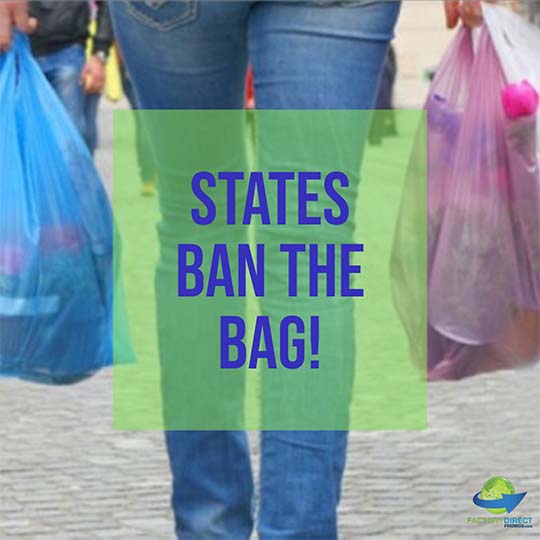States Ban the Bag!

More States Going Green with Plastic Bag Bans
Single-use plastic bag bans have steadily been gaining in popularity. What started out as one ban in San Francisco has spread to cities, counties and more recently, entire states. We decided to take a more in-depth look at recent efforts taken at the state level.
We are launching a new series, called States Ban the Bag! Each post will look at a different state with a bag ban in place and provide a more detailed look at their ban. The objective is to understand how the ban came about and what went into making the ban a reality.
Bag Ban Movement
We have been tracking the single-use plastic bag ban movement for a number of years. You can learn more and see the movement as a whole by checking out our bag ban map. This map tracks the success stories right along with the not-so-successful-stories. We strive to provide a big-picture look at the bag ban movement as a whole.
Types of Bans
Each bag ban is unique. Different states have different laws, so the process to implement a ban can vary greatly from one city or county or state to another. The details of each ban are also unique to each specific law. Some bans only prohibit single-use plastic bags while others also ban or impose a fee on single-use paper bags.
Lawmakers have also taken to defining what constitutes single-use when writing up their bag bans. The thickness of the bag is often the determining factor. Early in the bag ban movement, several municipalities found that by failing to clearly define single-use, some retailers would legally circumvent the ban by providing thicker plastic bags. These thicker bags were billed as reusable, but they had equally damaging environmental impacts as thinner plastic bags.
Reasons to Ban Bags
Most single-use plastic bag bans are a response to the damaging environmental impact of plastic bags. Bag bans often start in coastal areas and spread inland. There are a variety of reasons why people choose to ban single-use plastic bags.
Waste of Nonrenewable Resources
Single-use plastic bags are made from nonrenewable resources, like natural gas and petroleum. While there are currently large supplies of both of these materials, they are both in high demand and at some point, these resources will run out. Single-use plastic bags are unnecessary. Using these bags uses up nonrenewable resources which could be put to better use in a variety of other applications.
Lack of Responsible Handling
Single-use plastic bags are in fact recyclable. However, they are a pain to recycle, so most people do not recycle these bags. Single-use plastic bags are lightweight and can easily be picked up by gusts of wind. Meaning, if these bags are tossed into an open curbside recycling bin or garbage can, they may be carried away and end up as litter.
If the bags make it to a recycling facility, they are very likely to become stuck in the processing equipment. In order to remove the blockage and keep things moving the equipment must be brought down and employees must manually remove the obstruction. This is time-consuming and potentially dangerous.
This lack of recycling is really a shame because if single-use plastic bags were recycled, they could be re-manufactured into new bags again and gain.
Unfortunate Fate
Most single-use plastic bags end up as litter or in landfills. Plastic bag litter is a potentially fatal danger to animals and their habitats. Animals may mistakenly consume the bags or become tangled in them. When plastic enters the food chain it becomes a problem for every member of the food chain.
Plastic litter can also obstruct drainage systems which can cause major damage in flood-prone areas. For these reasons, may municipalities invest time and money cleaning up litter. Plastic in landfills is not an ideal situation, because it takes up space and contributes to landfills overflowing with trash.
Time to Take Action
Plastic is bad for the planet. Wastefully using plastic harms the environment and animals while also creating an ugly mess. Many lawmakers have taken action to ban single-use plastic bags to prevent this damage and the results have proven effective. So effective, that many states are now taking action.
#StatesBanTheBag is a series dedicated to states banning single-use plastic bags. We will go through each state-wide ban to explain the lead up to the ban, the implementation and when applicable the followup. Check back to learn more!
Stay in the know when green news breaks or when we offer Eco Specials by signing up for our newsletter!
Tagged




